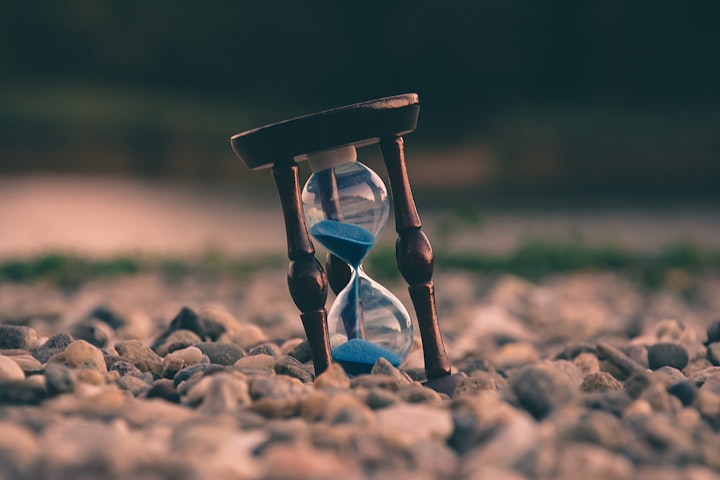Is Life Precious Because It Is Infinite?
Are we compensating?

So not many people look forward to death, even if they’ve lived a long and satisfying life. So it would seem there’s a big appetite for the opposite of death or immortality and a lot of scientists are working on if not immortality, per se, at least extending life by many years. Isn’t life precious in large part because it is so finite? And if there were an avenue toward immortality, how desirable would you find that?
I know my life has an end and that the end is not a blink of an eye in this sort of grand scheme of things. When I think about my own mortality, I experience a sense of urgency like, Oh, you know, those eight things on my to-do list, I better get them done, who knows how long I have left? So I have had my priorities, accentuated, but when I was in high school, I think it was in high school, there was a book that came out called How We Die. They actually got me on this whole thing where I started reading like all these books. I went on a death spree in a way, just reading about, you know, the mechanics of death. And my summary conclusion was that death itself wasn’t as frightening to me as dying, dying seemed to unequivocally suck. I was like, oh, dying sounds awful, you know, painful, terrifying. Death is just the absence of life. And you know, you’re not there anyway. It’s a long nap from which you don’t wake up.
But when I'm napping, I don’t know that I'm gonna wake up either. Every time you take a nap, which is every day, do you just say goodbye to everyone?
To everyone, the value of their own life is infinite. There is almost nothing that most of us would not do to save or extend our own lives. There are many cases in which we will go to great lengths to extend or save someone else’s life. But the notion of infinity as the value that we place on our own lives strikes me as resonant. To me, the notion of death and immortality is constrained by the fact that there’s uncertainty and it is finite. And so I got to thinking, well, what if you told me that I would live till infinity? What would life feel like? I don’t think it would feel very good. And I wonder how much of that is just because it’s so different? And how much of it is because it no longer has infinite value? Because it actually is infinite.
Scarcity heightens value in every possible way, like, if there is one last M&M on the planet, suddenly, that becomes more valuable than if there’s an infinite number of M&Ms. If it’s a multiple-choice between immortality and just living my life, as it’s being lived right now, with an end, I would pick mortality, I want to live forever. And I don’t think that the value of the days that I would be living, of course, an infinite number of them would go to zero, because I don’t have that boost from scarcity. There are other things that make your day valuable, or even pleasurable, that don’t depend on scarcity.
How would your life be fundamentally different, If you knew you were going to live forever?
I can’t imagine it wouldn’t be wildly different. Think of how long-lasting your friendships and relationships would be. Yeah, I’ve known him 150 years. Also, the world would get very crowded, nobody’s dying. On the other hand, you free up all that space from cemeteries.
I think the way children live their lives is in a way, kind of like the way somebody would live their life if they were immortal because they are really not thinking about their impending doom. And that means I’m thinking two things. One is the obvious thing, which is they are able to be carefree and in the moment and not have the future weigh on them. That’s kind of the obvious stereotype of how children are. But the other thing that children do, which I think is very interesting is they invest a lot in learning. And I think it’s developmentally adaptive. If you are a creature who does have a lifespan of x years, that at the very beginning of life, where you can get a lot of return on investment on your learning, you invest a lot in learning, whereas later on who knows, I might only have six seconds left, you know, you’re not signing up for Coursera. By the way, there’s this whole theory in psychology called terror management theory. The theory was developed by Jeff Greenberg, Sheldon Solomon, and Tom Pyszczynski and discussed in their 2015 book, The Worm at the Core. And it’s the idea that we have this conundrum as human beings uniquely, which is that like all other animals, we want to avoid death. We try to survive but unlike all other animals, we have conscious awareness of our impending mortality and this is terrifying.
It’s one of the many, many different things that people say when you ask them, what is the one thing that distinguishes humans from all other animals? We use the fork, we make jokes, right? There are a million things that you know, most of which are not really very accurate, but one of them which we know is— we’re going to die. And I think it’s a little presumptuous to not assume animals know they’re going to die. If only because sometimes you feel like you’re going to die. But animals have seen other animals die. Like they lie down and don’t get up. And are they so dumb that they don’t understand that that’s something different than life?
I think that one could certainly make the case that animals have seen death, probably more death than humans have, depending on the animal. But I do think you can make the argument that human beings have a certain kind of metacognitive awareness like you can see lots of animals die, but not kind of make the connection that you too are going to die. And then also like just to ponder that. And I’m not sure that animals have that sophisticated level. The major prediction from terror management theory is that we have these unconscious coping mechanisms for ways to deal with this anxiety that are not obvious. So when people try to bolster their self-esteem, or reaffirm their worldview, like their belief in the afterlife, for example, that is really just a way of dealing with the anxiety of knowing you’re going to die.
The notion of the afterlife goes back a long, long, long time into our most ancient traditions. And from my reading of it, it was both, let’s say, an incentive toward living a virtuous life. But also a means to respond to the uncertainty of death, because it was just so disturbing as it still is, for many people. In fact, I don’t know if the ancients were any more disturbed by death than we are because we’re so removed from death.
Now, we do seem to be pretty good at not really thinking about it too much. There has been a lot written about it including in the Sherwin Nuland book, I mentioned earlier, How We Die, about how modern society or modern America, in particular, has just removed death from life. It’s made a separate quarantined chapter, which is left to specialists. It used to be that you’d be buried by your family, you know, your body would be watched over by your loved ones. We had rituals. And there is somewhat of a return to that. However there are people who promote an offer kind of home burials and green burials and things like that; it is a movement, but a small one. But even cremation has grown a ton in the last three, four, or five decades. So I think there are a lot of rituals that are shifting. People wanting to get away from the formality of what has been for the last 100 or so years. But I do feel that as I get older, everyone around me obviously gets older, at the same rate. As far as I know, we might have to start carbon dating some of these people I know because they seem to go much, much faster. But it does strike me that thinking and talking about death, which is mostly considered a gruesome and off-limits thing is to me, prima facia, not gruesome and should not be off-limits.
******** **************** **********************
Like what you read? Send me a gift below to help contribute to my next adventure!
You can also sign up for my mailing list here: https://bit.ly/3el7KKa
About the Creator
Blessing Akpan
I am a photographer of thoughts, let me capture your soul.






Comments
There are no comments for this story
Be the first to respond and start the conversation.